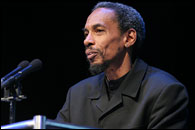Edward was born in St. Thomas, Virgin Islands on August 3rd, 1832. Denied admission to Rutgers Theological Seminary in 1850 on grounds of color, he immigrated to Liberia under the auspices of the American Colonization Society in December of the same year. Here in Liberia, he completed high school and ordained in the Presbyterian Church in 1860.
Availing himself of opportunities that presented themselves in the new Republic of Liberia, Blyden rose to become one of the singular most enlightened men of the 19th century contributing his original observations to religious thoughts, governance, diplomacy, national unity, and the development of race consciousness. His ideas would influence Africans and the African Diaspora in the Caribbean and America to develop concepts of Negritude, Pan Africanist thought, nationalist movement of West African clergy and educators, and Garvey’s back to Africa movement.
Edward Blyden’s magnum opus, Christianity Islam and the Negro Race published in 1887 was considered the most singular work of the 19th century.
Blyden worked in Gabon, Guinea, Liberia, Sierra Leone, and Nigeria.In 1861, Blyden became Liberian Commissioner to Britain and the United States; and a year later as Liberian Commissioner to the US to invite Negroes “back to the Fatherland.”
In served as Secretary of State from 1864 to 1866; later became Liberian Ambassador to the Court of St. James, London, United Kingdom on two occasions.
From 1880 to 1884 he served as President of Liberia College, and concurrently Minister of the Interior until 1882.
After an unsuccessful bid to become Liberia’s President in 1885, he migrates to Sierra Leone; however, he returns and becomes Liberia’s Minister Plenipotentiary and Envoy Extraordinary to the United Kingdom and France from June to September 1905.
He died on February 7th 1912 in Freetown and was buried at the Race Course Cemetery.




